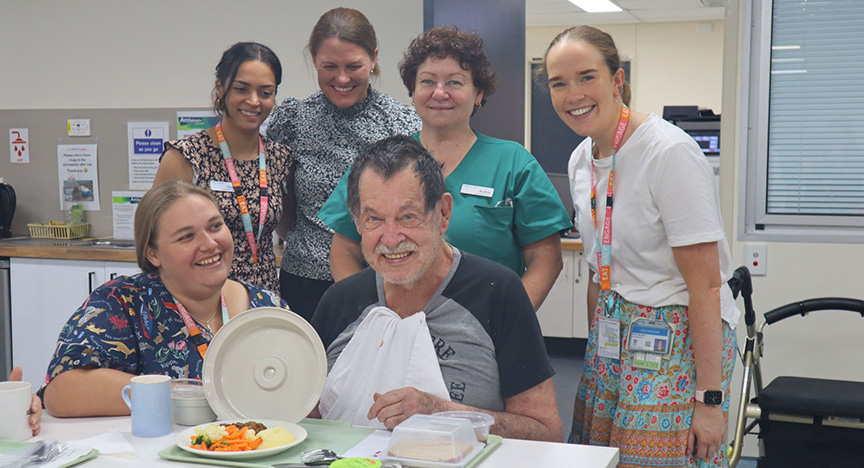
Ward 4B patient, Harry has experienced first-hand the dedication of QEII Hospital staff in his recovery for the past five weeks with special gratitude to the Eat, Walk, Engage program.
Harry's journey at QEII began after a fall at home, leading to a five-week stay in Ward 4B. Despite the challenges of recovery, Harry speaks highly of the hospital staff and the Eat, Walk, Engage program, placing emphasis on the impact of a patient-centred approach.
"The staff here are great. They do everything that they can for you, I couldn’t ask for more,” he said.
“I enjoy the food and the people. I put on my real clothes today, and activities like eating a meal at a table helps to make you feel more normal.”
The program is designed specifically for patients over 60 aiming to prevent hospital-acquired complications such as functional decline and delirium which poses a significant risk for this vulnerable population.
Keeping people engaged with conversation and activities in their environment through the program has reduced the overall length of stay as well as hospital acquired complications such as Delirium.
While these are the big achievements for the program, for Harry, the impacts are much simpler.
“It’s nice to have a conversation with people, I enjoy the company. You can have a chat over a cuppa.”
Senior Allied Health Assistant, Kathie Terks has been with the program since its inception and says the support of the wider Allied Health team and volunteers is the key to a successful recovery journey such as Harry's.
“The program emphasizes healthy eating, regular mobility, and full engagement. We have volunteers that come in and help us with our lunchtime meal but also engage in conversations and companionship for patients like Harry who may be away from their usual support networks.”
Kathie said the program is also helping avoid malnutrition through engagement at mealtimes highlighting the inspiration of a recent patient with deafness who wasn’t eating in bed at mealtimes but was reinspired to eat through a change of scenery.
“Sarah our Allied Health Assistant took her in a wheelchair downstairs, bought her some chips, and sat and ate the chips with her.
“She had such a positive reaction to the change of scenery and the companionship,” Kathie said. “It made such a difference to her stay with us, encouraged her to eat her meals, and ultimately helped her to go home sooner.”
Harry, who is expected to discharge home when community care support is ready, represents the success of the Eat, Walk, Engage program in promoting recovery and wellbeing.
The program was awarded QEII’s December Staff Award for Partnering with Consumers, and Harry's journey stands as a shining example of the positive impact of compassionate, patient-centred initiatives in the rehabilitation and recovery setting.